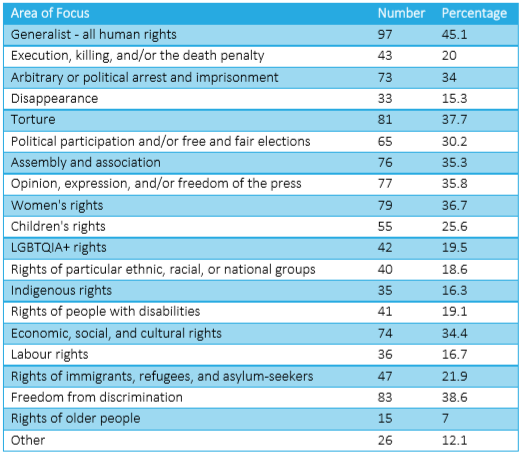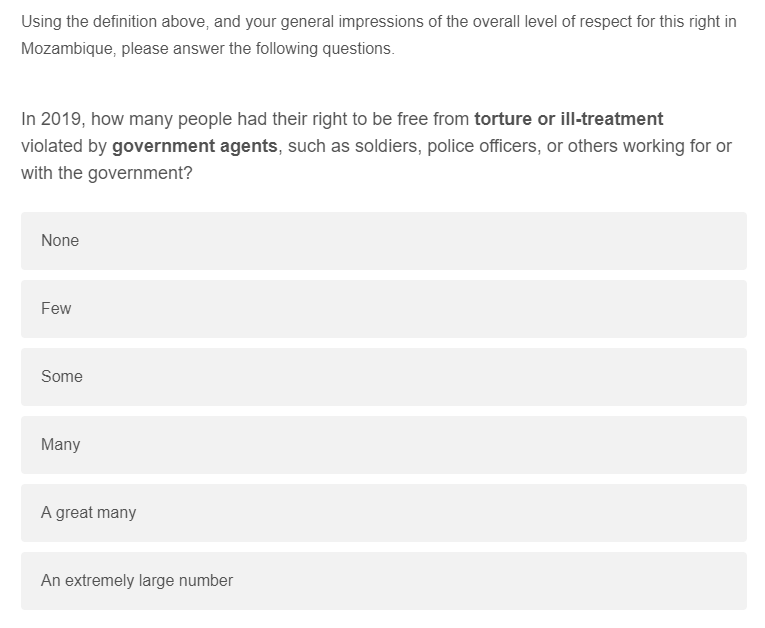Research credentials
HRMI is working to produce a comprehensive, robust, easy-to-access database tracking the human rights performance of countries.
HRMI is an independent, global research collective, funded by grants and donations.
HRMI is not an advocacy organisation. It exists to amplify the voices of human rights defenders by providing reliable, cross-nationally-comparable human rights data for civil society, researchers, the private sector, and states to use to improve the lives of people around the world.
Co-design processes are central to HRMI’s methodology, ensuring our data accurately reflect the experiences of human rights practitioners and meet the high standards of academics.
How will the data be useful?
HRMI is filling a measurement gap with robust, cross-nationally comparable data measuring the human rights performance of countries. These data are useful in several sectors:
- Civil society can use HRMI data in reporting and advocacy, particularly for highlighting trends over time, specific areas for improvement, and comparisons with peer nations.
- Journalists and human rights monitors can use the data as ‘hard numbers’ to provide a richer context for case studies and stories about particular people.
- Governments can use the data in negotiating with other countries, particularly in trade, aid, and development.
- Firms can use the data in deciding how to direct capital flows ethically, and how to manage their own risks.
Who is conducting the research and analysis?
Dr Susan Randolph
Economic and Social Rights Lead

Dr Susan Randolph is a co-founder of HRMI and the economic and social rights lead. Susan is a development economist and co-director of the Economic and Social Rights Empowerment Initiative, and an emerita associate professor of economics at the University of Connecticut.
Her book describing the methodology HRMI now uses, Fulfilling Social and Economic Rights, written with Sakiko Fukuda-Parr and Terra Lawson-Remer (Oxford University Press, 2015), won the 2016 best book of the year award from the American Political Science Association’s Human Rights Section, and the three authors were awarded the 2019 Grawemeyer Award for Ideas Improving World Order.
Susan has a PhD in economics from Cornell University. Her full CV is available here.
HRMI co-founder Dr K Chad Clay leads the design and development of our Civil and Political Rights metrics. Chad is a political scientist who researches and teaches classes on human rights, international relations, and political economy in the School of Public and International Affairs at the University of Georgia, where he is the Director of the Center for the Study of Global Issues (GLOBIS).
Chad has published widely in leading journals, and brings with him more than a decade of experience in the area of measuring human rights, including as co-director of the (now archived) CIRI Human Rights Data Project.
Chad received his PhD in political science from Binghamton University in 2012. His full CV is available here.
Dr K Chad Clay
Methodology Research and Design Lead

Co-design participants
HRMI uses co-design processes to make sure the experiences of human rights practitioners from all over the world are reflected in the methodologies and data presentation. Each stage of the initiative has been co-designed by a wide range of participants at international workshops, and thoroughly tested in a variety of settings. Many civil society organisations have sent staff to these workshops and contributed their expertise to the development of HRMI’s methodologies.
The result is that our findings have been widely accepted by both the practitioner and academic communities.
Headquartered in New Zealand
HRMI is a global collective of human rights practitioners and academics, headquartered in Wellington, New Zealand.
HRMI co-founder and development lead Anne-Marie Brook is a Motu Research Affiliate, and an Edmund Hillary Fellow.
HRMI also has a base of operations at GLOBIS, the Center for the Study of Global Issues, at the University of Georgia, in the United States.
Independent of our funders
HRMI has a strong commitment to independence, and requires an independence clause in all funding agreements. All funders are disclosed on the HRMI website.
HRMI’s Economic and Social Rights data
The unique and important contribution of HRMI’s economic and social rights data lies in the SERF Index methodology developed by Susan Randolph and her colleagues Sakiko Fukuda-Parr and Terra Lawson-Remer. The SERF Index compares a country’s performance on key indicators against a benchmark of what other countries at its level of income have been able to achieve. HRMI is thus able to measure how well a country is using its resources to ensure the progressive realisation of its people’s rights.
This methodology has been thoroughly peer-reviewed over several years, and its creators have won two prestigious awards: the American Political Science Association’s Human Rights Section’s award for the best book of 2016; and the 2019 Grawemeyer Award for Ideas Improving World Order.
As well as the award-winning book, Fulfilling Social and Economic Rights, two important peer-reviewed journal articles on this methodology are:
“Economic and Social Rights Fulfillment Index: Country Scores and Rankings” Susan Randolph, Sakiko Fukuda-Parr and Terra Lawson-Remer, in Journal of Human Rights, volume 9, No 3 (2010), pp 230-61.
“Measuring the Progressive Realization of Human Rights Obligations: An Index of Economic and Social Rights Fulfillment” Sakiko Fukuda-Parr, Terra Lawson-Remer, and Susan Randolph, in Journal of Human Rights, Volume 8, No 3 (2009), pp 195-221.
For economic and social rights, HRMI has published 10 years of data for up to 195 countries, depending on the right. Time trends are graphed on the HRMI data website.
For the countries that are also part of our civil and political rights data collection, there is also data collected on which groups of people are particularly at risk of economic and social rights violations.
HRMI’s Civil and Political Rights data
Abuses of civil and political rights tend to be hidden and undercounted. To address these challenges, HRMI gathers information using a detailed multilingual expert survey, asking human rights practitioners for each country for their appraisals across a range of human rights. HRMI then uses these data to construct measures that include a great deal more information than has previously been available, including data about human rights abuses that go unreported in public.
One of the strengths of this approach is that it gives access to information from global, regional, national, and local organisations, giving us a diverse pool of perspectives. Another strength lies in the use of advanced statistical techniques for combining, and ensuring comparability across, responses. This produces data on civil and political rights that are comparable across countries, and transparent information on statistical uncertainty, in the form of an uncertainty band around our measures.
HRMI’s method also collects information on which people in a country are particularly at risk of each type of violation, and qualitative responses giving more detail on the context of abuses in each country.
HRMI carries out the expert survey annually, expanding each year to include more countries.
This world-leading methodology is outlined in two peer-reviewed journal articles:
“Human rights data for everyone: Introducing the Human Rights Measurement Initiative (HRMI)” Anne-Marie Brook, K Chad Clay, and Susan Randolph, in Journal of Human Rights, Volume 19, No 3 (2020), pp 67-82, available as a free PDF download.
“Using practitioner surveys to measure human rights: The Human Rights Measurement Initiative’s civil and political rights metrics” K Chad Clay, Ryan Bakker, Anne-Marie Brook, Daniel W Hill, Jr, and Amanda Murdie, in Journal of Peace Research, October 2020, available as a free PDF download.
Frequently Asked Questions
Civil and Political Rights Methodology




